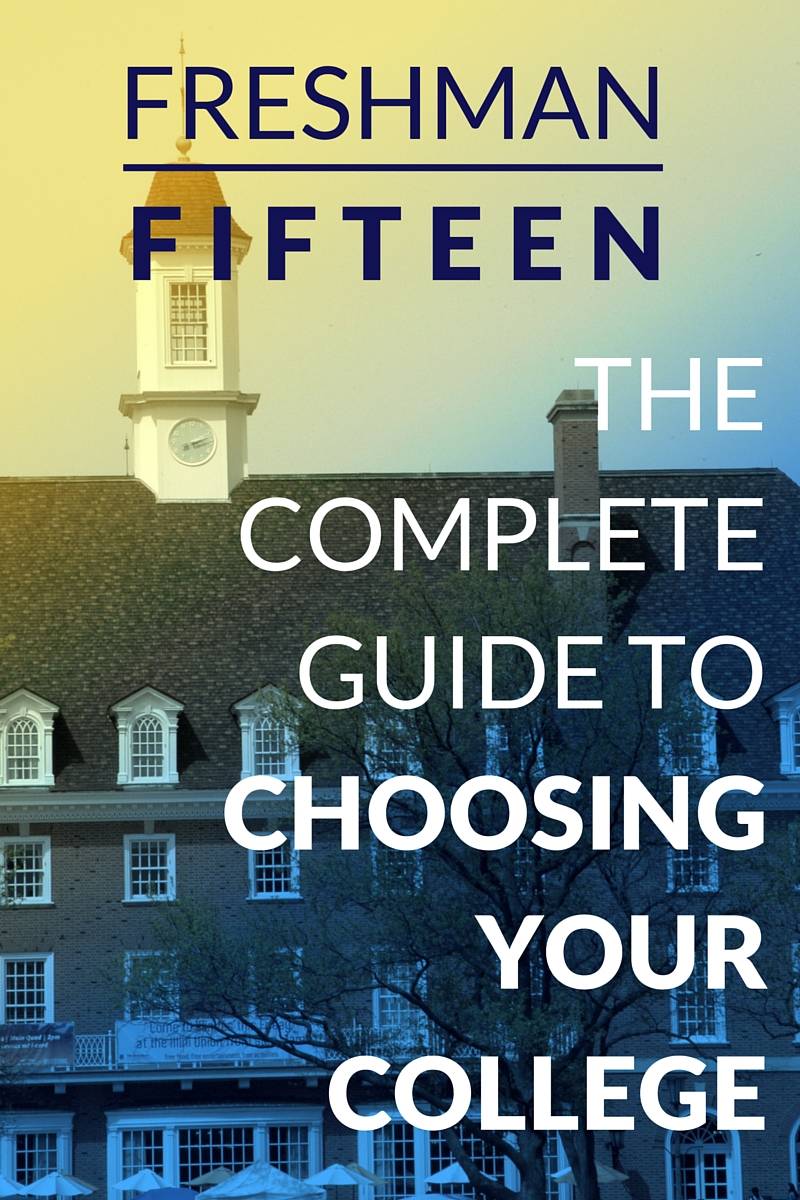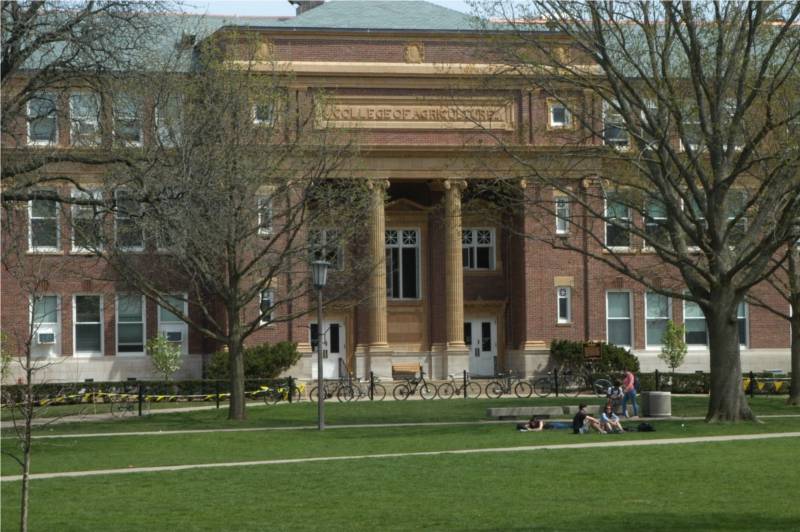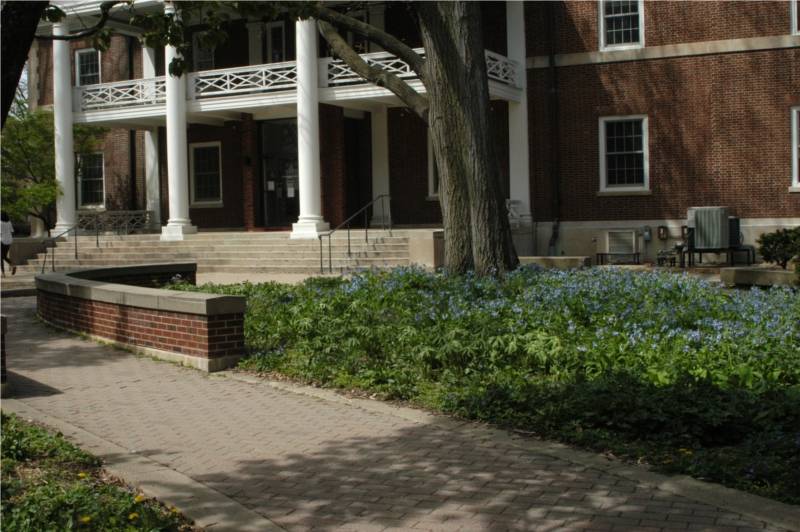This post is the first in a series I’m calling “Freshman Fifteen” – a set of fifteen posts that will walk you up to and into your freshman year of college. As they’re published, I’ll build an archive and interlink them, but until then, enjoy this first step:
Believe it or not, by April of my senior year of high school, I actually didn’t know where I was going to college. Between waitlists and decision making, I had to put a guess at my school beside my name in the graduation pamphlet. I ended up being right, but for any of you seniors out there still struggling, or any juniors in the house ready to get started for next year, here’s a breakdown of the factors you should have in mind when choosing your college.
Freshman Fifteen: The Complete Guide to Choosing Your College

Size
Size is an absolutely crucial factor in choosing a school. If I’m being honest, if I had to go back in time and choose a different school, I’d definitely pick a smaller one.
Big schools tend to have more opportunities, it’s true, and are a great choice if you’re not sure what you want to major in, or what extracurriculars you’re interested in. The sheer number of students means you’re going to have a lot of options. However, it’s easy to get overwhelmed at a big school, easy to get lost, and if you’re not very outgoing, it’s easy to fade into the background. That’s not to say some extraverted person won’t find you, or that the classes or groups you join won’t find you friends – it’s just a little harder to build a tight-knit community on a big campus. Big schools also tend to have stronger Greek and athletic communities.
Small schools are where that tight-knit community comes into play. This can be a good or a bad thing, depending on how you feel. Small campuses might have a more limited number of majors or student groups, less emphasis on sports, and often fewer research opportunities, but they could make up for that in intimacy. Expect smaller class sizes and more personal relationships with professors, in general. Small schools might also be more flexible about you adjusting your curriculum or even designing your own major.
And of course, there are medium sized campuses that combine the best of both worlds!
Location
Be honest about how far away from home you want to be or can be. I definitely know people from high school who dropped out of college because they couldn’t handle distance. And I definitely know people who couldn’t bear to leave home and didn’t get the education they wanted at community college, which has a lot fewer programs and opportunities.
Leaving home can be terrifying, I know. But if the opportunities you’re seeking in life can’t be found within a fifteen minute drive, you owe it to yourself to expand your search.
Likewise, you might feel like you can’t wait to get out of your hometown, but it’s worth remembering just how much you’ll be moving away from. You’re not just escaping boring Saturday nights with nothing to do and the same dull sights you’ve seen since you were six – you’re leaving your home, your favorite restaurant, all the places you made memories. If you’re determined to go somewhere far from home, research your travel options so you know how to get back when you need to.
Also consider in-city colleges vs. stereotypical “college towns.” My boyfriend goes to school in the middle of Chicago, and I’m in a town that loses half its population in the summer – our experiences are totally different! He has the convenience of big-city amenities and there’s always something interesting going on within a few train stops, but cities can be dangerous and intimidating for the uninitiated. On the other hand, my town’s a little slim on non-college activities, but everyone around here is used to students, and it makes for a pretty friendly atmosphere.
Programs
If you want to major in criminal justice and a school doesn’t offer that major, that is not the school for you. Don’t sacrifice your passion or purpose for something trivial like a pretty campus or a good location. Likewise, if you’re not sure about your major and your school doesn’t have strong support for undeclared students or switching majors, that is not the school for you. Go somewhere that’s going to prep you for success, starting from where you are right now.
Also consider the extra requirements of your major. If you’re hoping to get into med school, a college with a lot of research opportunities is going to make it a lot easier to build your resume than one without. Or you might want to look into colleges that share a town with a major hospital. Or ones that are affiliated with a med school you’re really interested in. Same applies for other specialized majors – keep your future needs in mind.

For example – some schools are agriculture heavy – that could be a good or bad thing, depending on how you feel about farming.
Cost
This is a super stressful part of the American college experience, and the best thing you can do is ask questions.
How are you paying for college? You might be going it alone, your parents might help, you might need loans – figure out all that in advance. Once you’ve got a school or two in mind, ask questions about it, too. Can you afford it? If you can but only with lots of loans, is it worth it? If they’re offering you tons of money, will you be happy there, or are you just attracted by the scholarship offer?
Make sure you follow up on all scholarship offers with questions about requirements and extensions – will they keep offering you that much money? What are the GPA requirements? What percentage of students manage to keep that scholarship all four years? What happens if you miss a paperwork deadline?
I’ve heard too many stories of people having to leave school because they can’t pay for it anymore, and too many stories of people taking that sweet full-ride scholarship… To a school they hate. College is a huge financial burden, so please educate yourself as much as you can and make good decisions.
Public vs. Private
Public colleges are affiliated with the state they’re in, and they’re largely funded and overseen by that state’s government. Public schools tend to be larger, less expensive – especially if you’re a resident of that state – harder to get financial aid from, and with a strong culture of school spirit/athletics. They also tend to offer a broad spectrum of programs, which could be a great fit if you’re unsure of what you want to do, and attract students from their own states.
States often have a giant “flagship” school – say, The University of Illinois at Urbana-Champaign – and smaller satellite schools – University of Illinois in Chicago and Springfield, Eastern Illinois University, Southern Illinois University, Northern Illinois University, etc. Their government-run status means that students are protected against the actions of the university in the same way they’re protected against the actions of the government.
Private colleges are, as you might have guessed, privately owned, and run on money from tuition and donations. These colleges, as a general rule, tend to be smaller, more expensive, more likely to give financial aid, and have less emphasis on athletics. Private colleges often make use of alumni donations and form strong – though sometimes small – communities of graduates. Private schools may have fewer programs or opportunities, but they might also focus on certain academic areas, which can be great if they align with your interests.
Private colleges can sometimes be run for-profit (think back to all those University of Phoenix commercials you’ve seen) and as privately-owned structures, aren’t subject to the same rules as public universities. This can be good, in that you’re not subject to state budget concerns or other legislative hindrances, or bad, in that students don’t always get the same protections regarding things like freedom of speech.
I wouldn’t rule out either type of school, but it’s worth being aware of the difference.
Campus
Look, just don’t be fooled by a viewbook. Humans are pretty visual, and if you see a picture of a gorgeous campus decked out in autumn colors and fall in love, you might ignore some serious warning signs about the school. Don’t be fooled, but it’s okay to listen to your gut. An ugly campus you can get past, but one that feels unsafe or unsuitable for you? Gonna make you miserable.
The other thing to consider is campus culture. This one is a little harder to nail down, and you might want to reach out to current students to get a feel for it. Take this example: My college is the number one party school in the nation. I am not much of a partier. That made it a lot harder for me to find the kind of connections I wanted here. Likewise, if you’re looking forward to college as a place to let your hair down, you might not want to go to a small private college with no Greek system.
If you don’t know anyone currently attending a school you’re interested in, see if you can find an online student community like a Facebook group or Reddit sub – they’re more common than you think!

Bonus points and eternal glory if the student community you reach out to shares your major/interest.
Why Are You Going?
If you can, go to a school because you love it. If your family is helping you pay for college, you might feel controlled by their choices, but make sure you’re not just going to college for someone else. And I’ll include significant others – boyfriends, girlfriends, and besties – in that category, too. I’m not trying to say that your love isn’t eternal, but don’t choose a college where you’ll be miserable without your person. It’s college. Things happen. Whether that thing is study abroad or a breakup, I don’t know, but be prepared.
One more word of warning – if the reason you want to go to a college is because you went to a really great party there, stop right now and do some thinking. College is a great time to have fun, relax a little, and find yourself. It’s your first taste of independence. But it’s also really freaking hard. Between academics, jobs, extracurriculars, crazy deadlines, and navigating the social scene, there’s a lot to handle in college. And if the only allure at your school is partying, that might be all you do – which doesn’t end well. I’ve seen this happen and it’s not pretty.
In short, be honest about your desires and motivations, and make decisions that make sense in the long term.
Still Feeling Lost?
I can’t say I blame you. This is super intimidating stuff. Don’t hesitate to reach out to your high school’s guidance counselor, or advisors or admissions staff at schools you’re interested in. The more information you have, the better.
If it’s decision making that’s paralyzing you, I have a present for you. This brainstorming sheet will help you get you your ideal college experience – you’ll focus less on “I want to go to a small college” and more on “I want to go to a college that feels close-knit but still has plenty of spirit” – or whatever it is you want from your experience. And it’s got a place to track all the important details of the schools you’re choosing between, for easy comparison.
The first section of the workbook will help you figure out exactly what you want from your college experience. The second section is a great resource for keeping track of the colleges you're looking at - and comparing them to the criteria of your ideal school! It's part of the resource library, which means 100% free for LBTL subscribers. Already in? Just head over to the library for your download. Not a member yet? I'll send you the password!
Watch your email - once you opt-in, you'll get the password to the resource library.


